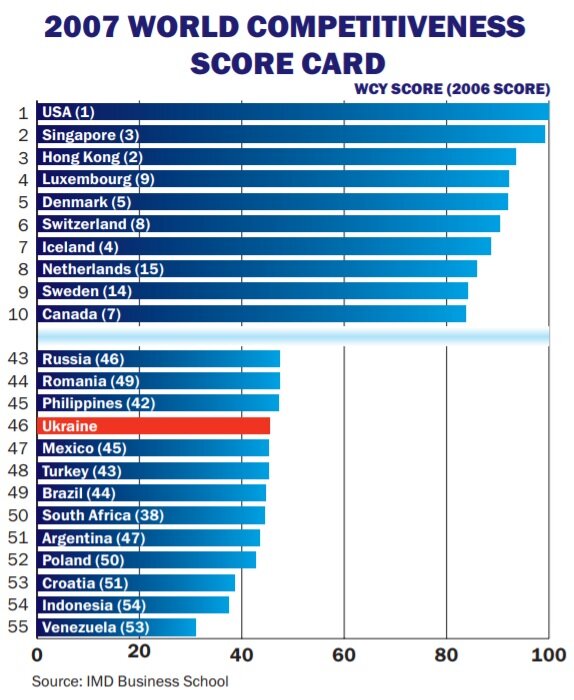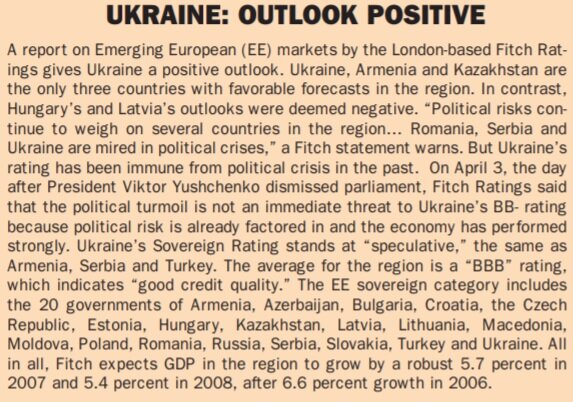The results of the annual World Competitiveness Yearbook ranking were announced on May 10 by the International Institute for Management Development.
Ukraine placed 46th in a ranking of the world’s 55 most competitive economies, between the Philippines and Mexico.The results of the annual World Competitiveness Yearbook ranking were announced on May 10 by the International Institute for Management Development (IMD) based in Lausanne, Switzerland.
The US led the ranking, closely followed by Singapore and Hong Kong. Improvements were noted by Switzerland, the Netherlands, Sweden, China and Germany. The research found that “a big shake-up” is on the horizon, as emerging markets are becoming emerging powers, according to Professor Stephane Garelli, director of the World Competitiveness Center.
“Economic and business power is shifting to new countries: China, Russia and India have together stacked up more than $1,700 billion ($1.7 trillion) in foreign currency reserves. Local companies from South-East Asia, India, China, Russia and the Gulf countries are buying industrial assets the world over.

“In all likelihood, industrialized nations will find it hard to tolerate such a power shift. They will not accept the loss of some of their ‘business jewels’ to newcomers without a fight. We shall thus face a year of rising protectionist measures. An increase in the number of complaints filed at the WTO (World Trade Organization) for unfair practices can be expected,” Garelli said.
Ukraine is expected to join the WTO late this year, or early next year. The government is currently holding final talks on membership.
In general terms, 40 economies are now increasing or maintaining their competitiveness compared to the US – in other words, “closing the gap.” Fifteen economies are losing ground.
He noted that for the first time ever, no country included in the survey is undergoing recession. Garelli also spoke about the potential of emerging middle classes in Asia and Central Europe.
Ukraine’s rank of 46 was better than Poland’s 52. The rest of the country’s neighbors scored higher, including Hungary, Romania, and the Czech and Slovak republics. Moldova and Belarus were not included in the ranking.
Russia beat Ukraine by three places with a score of 43. Russia leads all countries in terms of compound annual growth in the past 10 years.
Ukraine’s lowest scores came in the inflation, FDI and GDP per capita categories.
Ukraine received high rankings in GDP growth, trade and other macroeconomic indices, which placed the country higher in macroeconomic terms, according to Yuriy Poluneev, president of the Kyiv-based International Management Institute (MIM). He nevertheless cautioned that there are grounds to fear that Ukraine will not be able to maintain the same dynamics of macroeconomic development.
“The biggest problems are the quality of the regulatory environment, institutions and other factors that contribute to comfortable business conditions. In these respects [Ukraine is] at the bottom of the ranking,” he said.
The findings are based on statistics and interviews with business leaders in each country. In Ukraine, 165 interviews were conducted: 67 by the Kyiv-based MIM and 98 by IMD directly. IMD works with 50 partner institutes across the globe.
 For the 2007 survey, 55 national economies were graded according to 323 criteria. Two-thirds of the criteria are straight statistics, while one-third is a survey of opinions and perceptions of competitiveness held by business leaders. These were used to evaluate each country according to economic performance, government efficiency, business efficiency and infrastructure.
For the 2007 survey, 55 national economies were graded according to 323 criteria. Two-thirds of the criteria are straight statistics, while one-third is a survey of opinions and perceptions of competitiveness held by business leaders. These were used to evaluate each country according to economic performance, government efficiency, business efficiency and infrastructure.
In the survey, the US is ranked first and represents a score of 100. The other countries’ scores are expressed relative to the base score of 100. Fifteen countries scored lower than 50, including Ukraine.
In the 2007 edition of the survey, Ukraine and Lithuania were included for the first time.
The Lausanne-based IMD has been publishing the rankings since 1989 using a database that has been compiled over two decades. Its rankings are often cited by influential business publications, including The Economist, The Financial Times and The Wall Street Journal.
